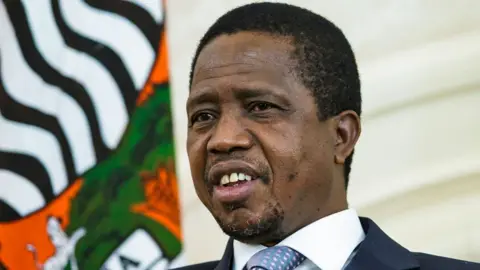A growing dispute has erupted in Zambia following the death of former President Edgar Lungu, as his family insists that current President Hakainde Hichilema should not be involved in his funeral proceedings.
Lungu, who passed away last week in South Africa at the age of 68 after a long illness, reportedly left strict instructions that President Hichilema must not come “anywhere near” his body. This revelation was made by family spokesman and lawyer Makebi Zulu, who stated that all funeral logistics had been arranged privately by the family.
The controversy adds a dramatic layer to an already tense relationship between the two political rivals. Lungu, Zambia’s sixth president, governed from 2015 to 2021 before losing to Hichilema in the 2021 election after several unsuccessful bids by the current president.
The Zambian government had intended to repatriate Lungu’s body on Wednesday for a state funeral, but disagreements with his family and his political party, the Patriotic Front (PF), over the funeral rites stalled the plan. While the government is pushing for a state-organized funeral to honor Lungu’s service, the family is demanding full control over the burial, citing the former president’s wishes.
President Hichilema, in a national address on Thursday evening, avoided commenting directly on the controversy but called for “peace, love, and unity” during a time of collective mourning. He urged citizens to “put aside our differences” and allow the late president to be honored with the dignity due to his former office.
Tensions were further inflamed by the PF’s claim that Lungu’s health may have deteriorated due to previous travel restrictions. The party argued that earlier access to specialized medical care abroad might have prolonged his life. The government has denied imposing any such restrictions.
Zambian Foreign Minister Mulambo Haimbe traveled to South Africa with a government delegation on Wednesday to meet with Lungu’s widow, Esther, and daughter, Tasila, in an attempt to break the impasse. Haimbe emphasized that while the family’s preferences are important, Lungu’s status as a former head of state makes his passing a national concern.
Despite prior remarks from the family indicating openness to a state funeral — provided they had input on its planning — recent statements show a firm insistence on a private ceremony. Zulu accused the government of disregarding the family’s role and warned against betraying Lungu’s final wishes.
The dispute has sown confusion among many Zambians, who are unsure how to participate in mourning the former leader. Although the government declared a seven-day mourning period starting last Saturday, the PF announced its own earlier and rejected the government’s official mourning venue, directing sympathizers to gather at its headquarters instead.
Legal experts, including constitutional lawyer John Sangwa, have called for legislation that clearly defines funeral procedures for presidents and former heads of state. Sangwa stressed that, while the public has an interest, the family’s wishes should take precedence.
Though Lungu stepped away from frontline politics after his electoral loss, he remained a key figure within the PF and expressed intentions to contest the presidency again. However, the Constitutional Court ruled late last year that he was ineligible to run, having already served the maximum two terms allowed by the Zambian constitution.

